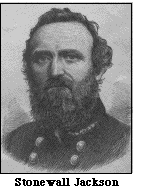1. WE have glanced at the campaigns which ended in the opening of the
Mississippi, and you have been told about the work of the navy. There was a great deal of fighting in the West, and the Union armies were much more successful there than in the East.
2. The Confederate force in the east was called the Army of Northern Virginia. It was first commanded by General Joseph E. Johnston, and afterward by General Robert E. Lee. For months and even years, it beat back the Union army, often of superior force, in its many efforts to capture Richmond, the capital of the Confederacy.
3. General McDowell, as you have learned, made the first attempt in July, 1861. The second was that of Gen-
(204)
 Lee,
on the old battle-field of Bull Run. He retreated to
Washington, resigned his command, and General McClellan was
again placed at the head of the Army of the Potomac.
Lee,
on the old battle-field of Bull Run. He retreated to
Washington, resigned his command, and General McClellan was
again placed at the head of the Army of the Potomac.


